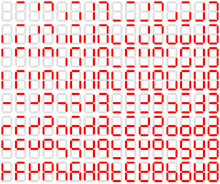

| ||||
|---|---|---|---|---|
| Cardinal | one hundred twenty-eight | |||
| Ordinal | 128th (one hundred twenty-eighth) | |||
| Factorization | 27 | |||
| Divisors | 1, 2, 4, 8, 16, 32, 64, 128 | |||
| Greek numeral | ΡΚΗ´ | |||
| Roman numeral | CXXVIII | |||
| Binary | 100000002 | |||
| Ternary | 112023 | |||
| Senary | 3326 | |||
| Octal | 2008 | |||
| Duodecimal | A812 | |||
| Hexadecimal | 8016 | |||
128 (one hundred [and] twenty-eight) is the natural number following 127 and preceding 129.
128 is the seventh power of 2. It is the largest number which cannot be expressed as the sum of any number of distinct squares.[1][2] However, it is divisible by the total number of its divisors, making it a refactorable number.[3]
The sum of Euler's totient function φ(x) over the first twenty integers is 128.[4]
128 can be expressed by a combination of its digits with mathematical operators, thus 128 =28 − 1, making it a Friedman number in base 10.[5]
128 is the only 3-digit number that is a 7th power (27).

One hundred [and] twenty-eight is also: